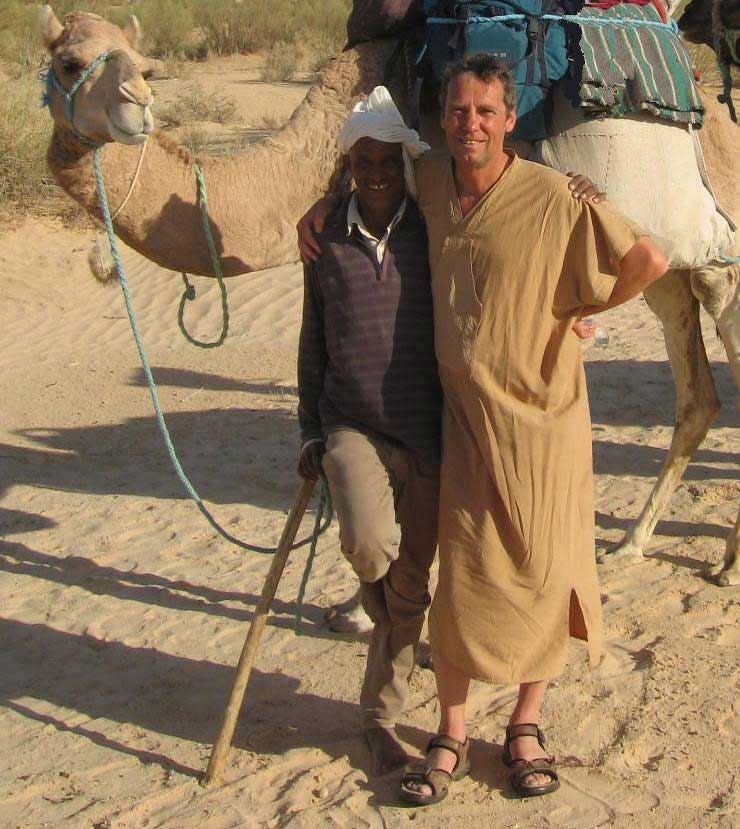Probably all of us are facing a future with a lot more uncertainty, and a lot less control. So what can we learn from people who have been living positively in that condition for thousands of years? By definition, nomads represent an extreme example of this, having no ownership or control of land, very few assets, and being at the mercy of whatever the climate throws at them.

Some of the most inspiring times of my life were the ten retreat groups I organised in the Tunisian Sahara, travelling by foot and camel with semi-nomadic Bedouin guides. You can see my blogs about these trips here.
These were men born and bred in the desert, as nomads, who in the 1980s had to move to a town because climate change had dried up the shallow wells and springs. They still bred and herded camels in the desert, and they loved my groups because they were back in the life they loved.
The Bedouin are profound teachers by their approach to life. Although their situation is materially tough and basic, they are happy, dignified people. As they sit in a circle in the chilly light before sunrise, they are chatting, lighting the fire, making the bread, tending the camels and singing. I join them and ask myself, “Is this work time or social time?”, knowing that this is a western mindset and the question would be meaningless to them. Their songs move seamlessly from praise of Allah through romantic ballads to children’s play songs. Their days really are a flowing dance uniting, work, spirit, fellowship and recreation. Because of some of them speak good French, this is a rare chance to share the life and culture of people who are still within the semi-nomadic tradition.
You might think that losing the nomad life, living quite poorly in a town, would leave them despairing or bitter, but it hasn’t. They are some of the most happy, resilient people I’ve met. Around a campfire under a million stars, we’d ask why. They said, “You may be rich in things, but we are rich in our families.” Beside their deep, tribal sense of community, I could see that they had roots in their love for the desert, and in their faith, in Islam. A friend who works in Palestine says this is all true there.
Physical navigation in the desert is very difficult: there are no roads, and very few features you can put on a map. If you go into the desert with native Bedouin guides, as I have done many times, they never use a map or compass. They navigate the desert as their forebears did in Old Testament times. They literally know the desert like the back of their hand: every dune and contour, every stump of palm or odd shaped rock, they can distinguish and steer by. My guess is that the Bedouins’ love for this land nourishes them so deeply because it feels like a reciprocal relationship: their intimate knowledge of the land, their rapport with its fragile ecosystems, enables them to navigate the desert, and even harvest from it, in the sense of finding grazing for their camels.
On most of my retreats, we had 24 hours where the visitors went into silent, solo time. On one trip, I had a friend who is an organic farmer in Surrey: he said he spent a lot of time on his farm alone and in silence, and would rather spend this time living with the Bedouin. This gave him and me a deeper sense of how they operate as a community: they seem more like a group, and less like individuals than westerners, and they moved seamlessly from one combined task to the next.
It is probably no coincidence that Islam originated in the desert, and that the Prophet Mohammad organised camel caravans before he received divine inspiration. I have studied Islamic teachings enough to see their beauty, and their relevance to a life without control. The Fateha, the Islamic equivalent of the Lord’s Prayer, celebrates the idea of divine unity, recognises a bigger power than the human individual, and calls upon that power for compassion, guidance and inspiration.What might be called the spiritual resilience of the Bedouin is well worth exploring further: if this interests you, see my blog on Desert Wisdom: the book and the nomads.